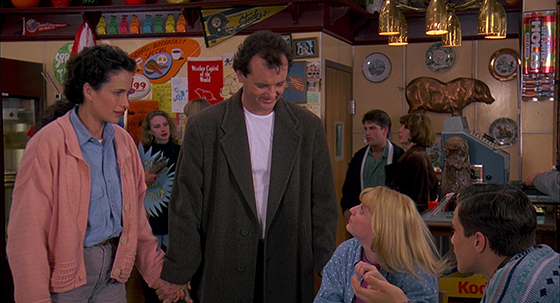Groundhog Day

(L-R) Phil Connors (Bill Murray), Rita (Andie MacDowell), Debbie (Hynden Walch) and Fred (Michael Shannon) in GROUNDHOG DAY.
What makes a movie great is not what it is about, but how it is about it.
– Roger Ebert
Sometimes, a movie is so light of foot that its brilliance goes unnoticed. A decade before LOST IN TRANSLATION, Bill Murray made his journey from sketch comedian to absurdist existentialist as the choleric weather reporter, Phil Connors, in Harold Ramis’ GROUNDHOG DAY. The film is named for the annual rite in which the townspeople of Punxsutawney, Pennsylvania, gather to see if a groundhog will see its own shadow—forecasting a six-week extension of winter into March or, as we North Dakotans call it, Still Winter.
Diverted by a snowstorm, Phil, his segment producer Rita (Andie MacDowell) on whom he has a brewing crush, and camera operator, Larry (Chris Elliott), find themselves stranded in Punxsutawney for the day until roads are cleared. The day passes, not without irritation for Phil who finds tolerating the local flavor an exercise in willpower—”rustic” is not a concept he embraces. Morning arrives; the next day does not. Phil inexplicably repeats February 2nd, again and again.
As in GHOSTBUSTERS, Murray and writer/director Ramis (who cameos as that kind of doctor who knows your vices better than you do) work exceptionally well together. Instead of milking every scene for gags, or keeping others from believing Phil purely to fabricate tension, they execute an honest story at face-value, laying in setups and payoffs where they intrinsically belong: At the end of the second act, Phil exposes the doubts of a newly engaged couple, Debbie (Hynden Walch) and Fred (a young Michael Shannon)—you’ll see them again. Ramis and Murray achieve a harmony of wit and wisdom that works so effortlessly on you, on us all, the phrase “Groundhog Day” in American vernacular has become a synonym for déjà vu.
Re-living the same day ad nauseam, Phil’s amassed knowledge serves his interests—at first mundane, then selfish, then prurient. When he runs out of amusements, he turns to desperation. Like a walk-through of Kübler-Ross’ Five Stages of Grief, GROUNDHOG DAY takes us through Phil’s denial, anger, bargaining, depression and acceptance, epitomized in Phil’s repeated encounters with the dreadfully-cheery Ned Ryerson (Stephen Tobolowsky). An insurance salesman, Ned’s one of those classmates we all know, who inconveniently resurfaces with an utterly transparent motive—Amway zombies come to mind. Phil attempts to ignore, run, and even punch out Ned. Ultimately, Phil’s solution lies in embracing his fears.
In the depths of despair over his inescapable predicament, Phil invests so much time trying to die he doesn’t immediately see the lesson. After Phil tries everything to no avail, including the always macabre, occasionally funny toaster-in-the-tub trick, he takes to learning the piano. That he gains the skill of at least a good lounge tinkler suggests to us he’s re-lived February 2nd more than a few hundred times. Eventually he exhausts the possibilities and free of the fear of both being alive and stuck or dead and gone, he starts to collect seemingly meaningless bits of knowledge that accumulate into wisdom.
Having conquered death, and Ned, the parlor tricks Phil accomplishes with infinite knowledge seem infinitesimally trivial. Soon, his interests turn to Rita and her charms—whatever they are. Since St. Elmo’s fire, I’ve thought attempts to mythologize Andie Macdowell misplaced at best. In his Great Movies review, Roger Ebert concluded, “There is a moment when Phil tells Rita, ‘When you stand in the snow, you look like an angel.’ The point is not that he has come to love Rita. It is that he has learned to see the angel.”
But the real revelation lies elsewhere, in an unusually-gripping scene for a comedy. From his repeated attempts to save a dying, homeless man, Phil learns the most difficult lesson about time: Sooner or later, it just runs out. He stops trying to game the system and the people he sees as unwitting pawns relative to his omniscience.
By evening, at the big shindig, we discover that Phil has used his infinite knowledge of how and why things work to make people’s lives better, whether he’s improving the quality of life of a dying man or buying Wrestlemania tickets for newlyweds—remember Fred and Debbie?
Finally, Phil discovers the virtue in re-living the same day is not that it is the same day. It could be a different day, but to treat each day as though time were no object, one pursues goals that have no immediate payoff. Time is the most valuable commodity we have, and happiness the most prized outcome when time is invested wisely. Phil’s profound triumph isn’t that he’s learned to see the angel in Rita. It’s that he’s learned to see the past, present, and future in each of us and, most crucially, in himself.
GROUNDHOG DAY is being re-released in limited theatrical engagement for its twenty-fifth anniversary.